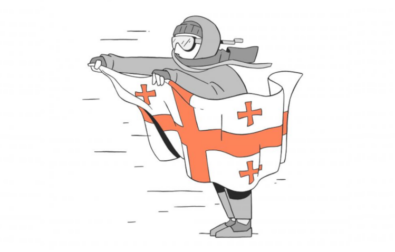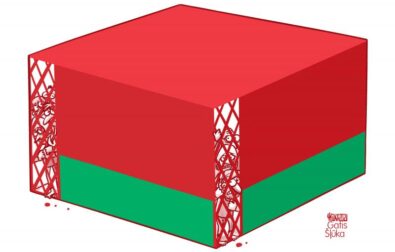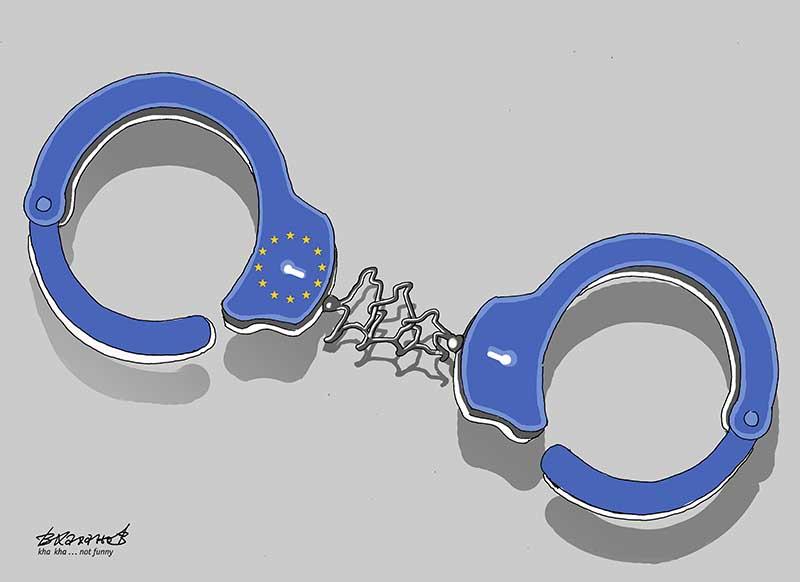Claim to be verified: In the four first months of 2025, the Greek authorities arrested 150 refugees and migrant-smugglers.
Context: Halting immigration by arresting migrant traffickers is a top priorities of Greece’s right-wing government. To this purpose, and to show some achievements, it has been applying a very broad definition of “smuggler”. Meanwhile, the courts are meting out hasty justice to migrants, often in disregard of the rule of law.
On 17 April 2025, during a morning show on Greek broadcaster SKAI TV, newly appointed Minister of Migration and Asylum Makis Voridis claimed that “over 150 smugglers” of refugees and migrants had been arrested in the first four months of the year. "An illegal smuggler is arrested almost every day," he repeated later on Action24 TV.
But a closer look at legal records and judicial practices on the Greek islands raises serious doubts about this claim – and about how the term “smuggler” is being applied.
What’s in a “smuggler”?
Over the past three years, Solomon has monitored dozens of smuggling trials on the Aegean islands of Lesvos, Samos and Chios. Almost without exception, the defendants were asylum seekers who had crossed into Greek waters in overcrowded dinghies. Their crime? Being at or near the helm.
None of these defendants were proven members of organised criminal networks. Instead, they were charged with facilitating illegal entry – often arbitrarily, simply because they had touched the rudder or were sitting near the front of the boat.
Despite this, they were prosecuted under anti-smuggling laws that carry extremely heavy penalties, often equivalent to those for organised crime or terrorism.
Quick trials, long sentences
In these cases, access to a fair trial is often absent. Language interpretation is poor or non-existent, and legal representation is minimal. Lawyers are frequently appointed the day of the hearing and given only minutes to review the case files.
Between 2014 and 2019, researchers documented 48 such trials, with an average sentence of 48 years. Yet the average trial lasted just 38 minutes, and some were as short as 15.
In June 2025, for example, 16 asylum seekers were tried in Samos for smuggling. Ten were acquitted thanks to support from local legal organisations such as the Human Rights Legal Project in Samos and the Legal Center of Lesvos, or European organizations like Borderline Europe. Without such help, they might have joined the hundreds of others currently serving decades-long sentences.
From Turkish mafia to desperate passengers
From 2010 until approximately 2015, the year over a million Syrian refugees reached Europe via the Balkan route, the boats ferrying refugees across the Aegean were often piloted by Turkish nationals. But as more of them were jailed, the Turkish mafia behind the networks looked for alternatives. Increasingly, captains were recruited from among the passengers themselves – often randomly or by coercion.
Refugees reported being pressured or tricked into steering the boat, sometimes at the last moment. Young men or unaccompanied minors were particularly targeted, as they were seen as more “expendable” or more likely to receive lenient treatment if caught.
The same pattern has emerged in Italy and elsewhere: in recent years, more than 1,000 asylum seekers have been prosecuted for driving boats. Between 2015 and 2019, Greece recorded over 7,000 arrests for smuggling-related charges.
When victims become scapegoats
Some of these cases are tragic. One defendant, Mohamad H., a Somali asylum seeker, was accused of being responsible for his boat’s capsizing – even though other passengers testified that he had tried to save them. Another, Hassan, took the helm when their boat became unmanageable. He was carrying his severely disabled mother on his shoulders during boarding.
Others were charged simply for using their phones to navigate or call for help. In one case, a man trying to activate GPS on his mobile phone was accused of facilitating entry and sentenced to over 140 years in prison.
The same tactics can be seen in northern Greece, where minors are often forced to drive vehicles and risk fatal accidents. In all these cases, the real smuggling networks remain untouched. The same practice is observed on routes from Turkey to Italy (where Ukrainian captains previously operated), and also on routes from Libya to Italy.
Earlier data indicated that over 2,200 people were imprisoned in Greece on charges related to trafficking or “facilitating illegal entry”. On the Action24 show, Makis Voridis (who has been replaced by far-right Thànos Plévris on 28 June) mentioned that a large proportion of Greece’s prisoners are migrant smugglers. In fact, alleged smugglers reportedly constitute the second largest group of prisoners.
A similar situation is observed in other EU entry countries. In Italy, for example, a report identified over 1,000 criminalised asylum seekers who were found to be boat drivers over the last decade. Greece saw 7,000 arrests for illegal trafficking between 2015 and 2019.
Absent witnesses, unused evidence
Another recurring problem is the quality of testimony in court. Solomon has documented numerous cases in which the coastguard officers testifying had no direct knowledge of the events. Their evidence was based on reports written by colleagues, with no possibility of cross-examination.
If hundreds of “smugglers” are being imprisoned, yet trafficking networks continue to operate, something is wrong with the current approach
In 68% of 81 cases analysed by Borderline Europe across various Greek regions, police or coastguard witnesses were absent in court altogether. Some trials lasted just six minutes.
Even when asylum seekers provided detailed information about actual smugglers – names, phone numbers, payment locations – these leads were rarely pursued by authorities.
The Pylos shipwreck, a case in point
The most high-profile example of flawed smuggling charges was the 2023 Pylos shipwreck, in which more than 600 people drowned. Nine Egyptian survivors were arrested as smugglers and jailed for a year, despite Egyptian authorities informing Greece that they were passengers, not traffickers.
An international investigation led by Solomon found that these men had paid for their places like everyone else. Their year-long detention, despite exculpatory evidence, highlights the systemic failure to distinguish between actual smugglers and the people they exploit.
Inflated numbers, flawed definitions
Minister Voridis’s claim of 150 smugglers arrested in just four months may be technically accurate, but only using a definition that includes asylum seekers coerced into steering dinghies. Many of those individuals were underage or acting under duress.
The question is not just whether the numbers are right, but whether they are meaningful. If hundreds of “smugglers” are being imprisoned, yet trafficking networks continue to operate, something is wrong with the current approach.
Rather than dismantling smuggling operations, this policy criminalises the very people it claims to protect. It has turned victims into scapegoats and swelled prisons with people whose predicament involved little choice.
🤝 This article was produced with the support of the European Media and Information Fund (EMIF). It may not necessarily reflect the positions of the EMIF and the Fund Partners, the Calouste Gulbenkian Foundation and the European University Institute. The sole responsibility for any content supported by the European Media and Information Fund lies with the author(s) and it may not necessarily reflect the positions of the EMIF and the Fund Partners, the Calouste Gulbenkian Foundation and the European University Institute.
Desde la década de 1980 y la financiarización de la economía, los actores financieros nos han mostrado que los vacíos legales esconden una oportunidad a corto plazo. ¿Cómo terminan los inversores ecológicos financiando a las grandes petroleras? ¿Qué papel puede desempeñar la prensa? Hemos hablado de todo esto y más con nuestros investigadores Stefano Valentino y Giorgio Michalopoulos, que desentrañan para Voxeurop el lado oscuro de las finanzas verdes; hazaña por la que han sido recompensados varias veces.
El evento >










